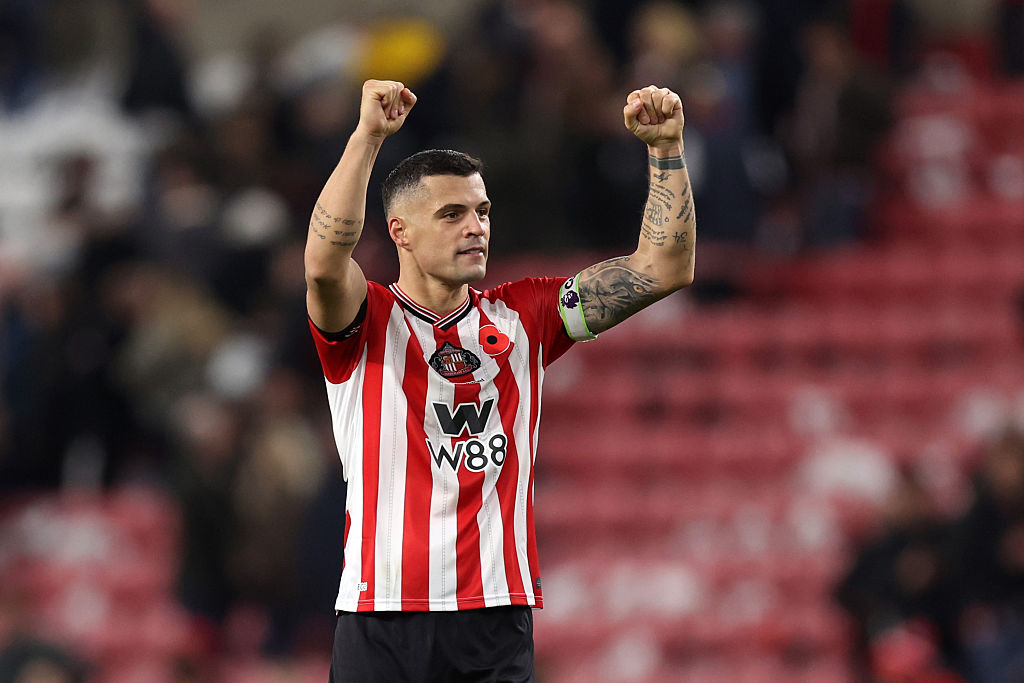33 amazing unseen images behind the 1966 World Cup scenes
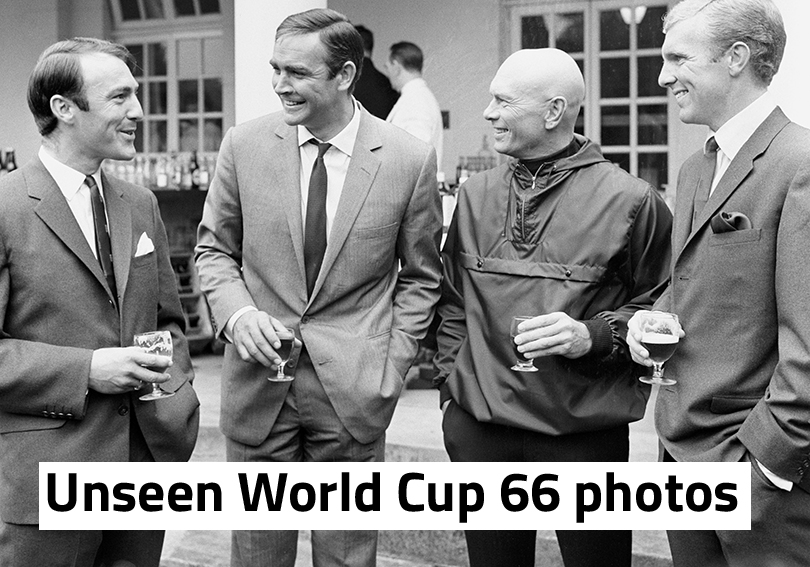
Unseen behind-the-scenes images from 1966
We've all seen some pictures from the 1966 World Cup a million times. But dig a little deeper, and you'll find that away from the match action there was a multitude of fascinating stories – encapsulated in some stunning imagery.
So join us on an informative, entertaining trip down Memory Lane to England’s finest hour. You’ll meet sombreros, a not-so-lucky chimney sweep, Argentinians playing crown green bowls, a curious ice-cream seller, a bloke playing an accordion and the story of football’s least likely sex “scandal”…
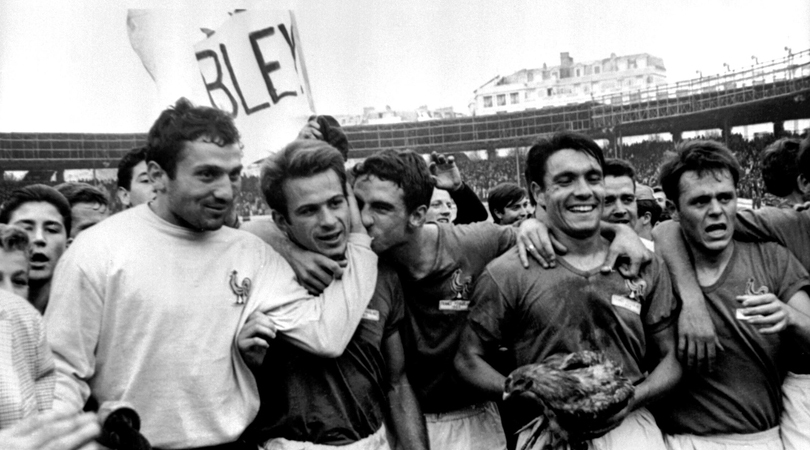
9/9/65: Que sera sera...
“Wem-ber-lee” in a French accent: les Bleus celebrate qualification in traditional style, with the fans holding a banner and a player (Joseph Bonnel) parading a cockerel. Semi-finalists in 1958 thanks to Just Fontaine’s 13 goals – surely an unbeatable tournament record – France had missed out on Chile 1962 and were determined to enjoy the moment.
Battling for the 16 places at the 1966 World Cup were a record 70 countries, despite a boycott from 31 African nations protesting their requirement to play-off against Asian teams; that requirement was shelved from 1970 onwards.
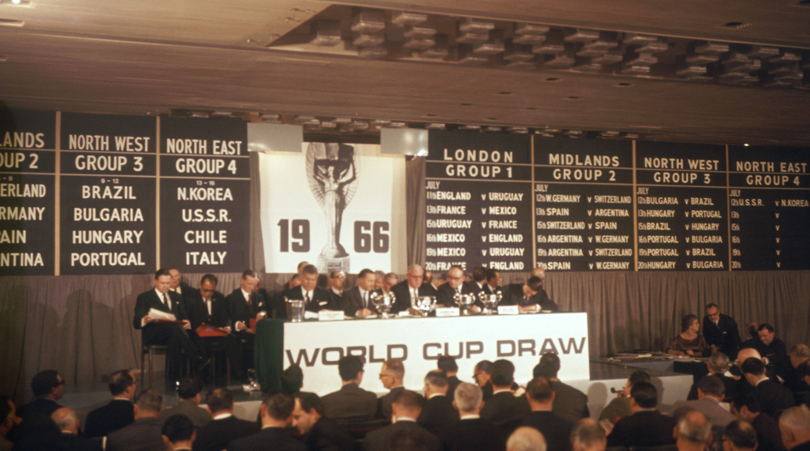
6/1/66: The draw specialists
Held at the Royal Garden Hotel, the draw was the first to be televised. The hosts were seeded along with eventual finalists West Germany, holders Brazil and the ultimately disappointing Italy. The groups were based geographically: London (Wembley and White City), ‘Midlands’ (Villa Park and Hillsborough), North-West (Old Trafford and Goodison) and North-East (Ayresome Park and Roker Park).
A luxury five-star job freshly built in the heart of Kensington, the Royal Garden would also host the reception for the winners (spoiler alert: it was England). It has also catered for other famous residents from The Beatles to Justin Bieber.

10/1/66: A nation of dog-lovers
Ticket office staff deal with applications at the somewhat underwhelming White City “HQ”. The only WC66 stadium not to be regularly used for football – although in the early ‘60s, nearby QPR had considered moving in – White City had been built for the 1908 London Olympics and had hosted speedway, boxing, swimming, athletics, rugby union and rugby league.
However, it was best known for greyhound racing, and it was because of the dogs that it hosted a World Cup match at all: Wembley had a lucrative Friday-night greyhound meeting and the owner refused to rearrange it just because France needed to play Uruguay. Instead, 45,000 watched them at White City. The stadium was demolished in 1985 and the BBC now occupies the site.
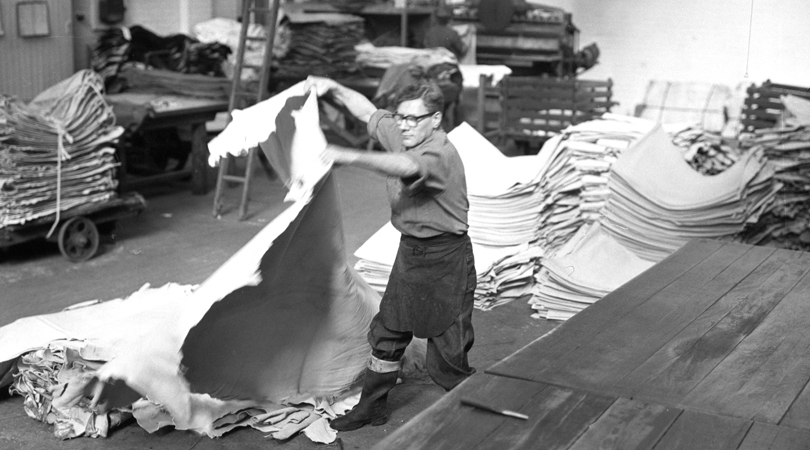
13/3/66: Ballers
Just a bloke called Arnold Goldthorpe, making balls for the World Cup. Slazenger’s Challenge 25-panel football was selected as the official match ball and was available in three colours: orange for daytime games, white and yellow for floodlit matches.
The cow-hide that Arnold’s holding, at Slazenger’s tannery in Yorkshire, would make four match balls. Since 1970 the official balls have been provided by Adidas, but Slazenger lays claim to the longest sponsorship in sports history: they’ve been sending their balls to Wimbledon for the tennis since 1902.

23/6/66: The signs they are a-changin’
Every event needs its organisers, and in the UK the Automobile Association have helped out since 1905 by erecting road signs. Indeed, by the early 1930s – when responsibility was passed to local authorities – the AA had erected 6,000 direction signs and 15,000 village signs around the country. Most of them were removed during the Second World War in case of invasion, but here we see officials preparing for much more benign visitors.
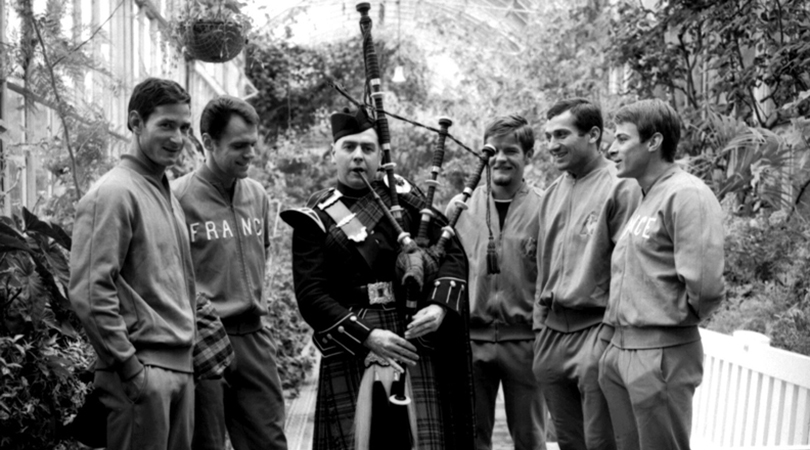
23/6/66: A traditional welcome
One of England’s nearest neighbours, France prepared for the World Cup by massively overshooting and spending a fortnight in Scotland at the Peebles Hydro Hotel. Here, captain Marcel Artelesa, Lucien Muller, Robert Budzinski, Marcel Aubour and Philippe Gondet react with an understandable mix of emotions to the hotel’s resident piper Alexander Brown.
While in Scotland, a France squad also including Jean Djorkaeff (Youri’s dad) played and pummeled a variety of local teams 8-1, 8-0 and 11-2; as preparation, it proved of little use as they crashed out in the groups after drawing with Mexico and losing to Uruguay and the hosts.
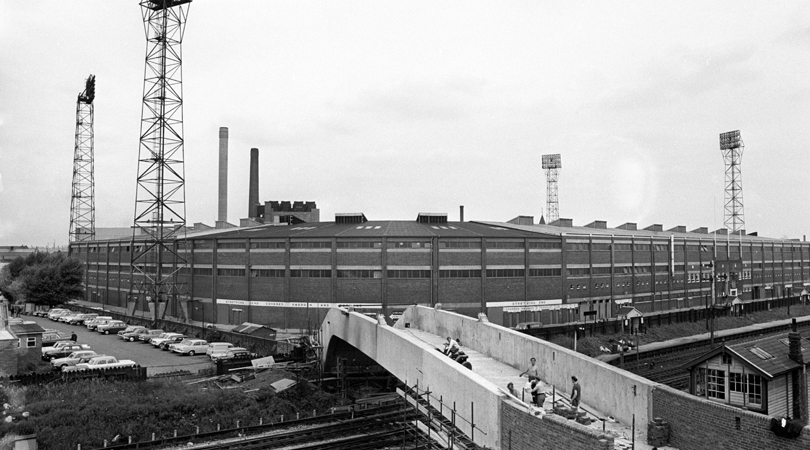
1/7/66: New Trafford
In 1966 FIFA’s requirements for hosting matches were nothing like as stringent as today, but there was still the need to construct a new footbridge over the railway that binds tight to the south stand of Manchester United’s Old Trafford. With England having won the hosting rights in 1960, United’s board had long seen the opportunity to update their ground.
The United Road stand (lately renamed after Sir Alex Ferguson) at Old Trafford’s northern side had been completely redesigned at a cost of £350,000, with a modern cantilevered roof removing the need for pillars obstructing the view of the 20,000 spectators – half seated, half stood. While they were at it, architects Mather and Nutter also switched the fans so the terrace was in front of the seats, while adding British football’s first private boxes. It’s not known if they served prawn sandwiches.
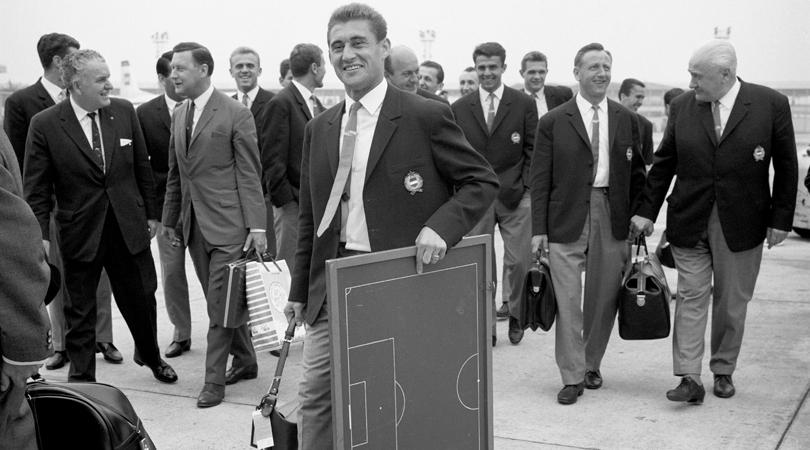
4/7/66: The tactics toter
When the Hungary team arrived at what was then still called Ringway Airport in Manchester, head coach Lajos Baroti’s tactics board was carried in by willing striker Dezso Molnar – the squad’s freshest face with just one cap to his name.
The Magyars weren’t quite as mighty as in their 1950s heyday, although they could still call upon talents like elegant string-puller Florian Albert, deep-lying centre-forward Ferenc Bene and 50-goal Lajos Tichy, nicknamed the Nation’s Bomber. Recovering from an opening 3-1 loss to Portugal, Hungary beat Brazil and Bulgaria by the same scoreline to reach the quarter-finals – presumably with the help of that tactics board.
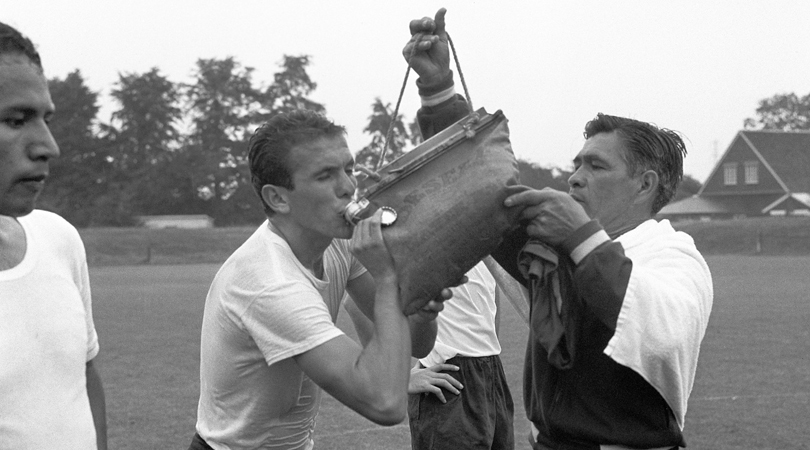
5/7/66: Gets to your thirst - fast
It’s probably not isotonic, but this good old-fashioned "Corporation Pop" looks very satisfying to Mexico midfielder Jose Luis Gonzalez; although trainer Francisco Larios is holding the water-bag, Mexico were managed by Ignacio Trelles, who would go on to take charge of more than 1,000 professional games in a career lasting more than 40 years.
Drawn in the London-based Group 1, El Tri had been allocated Finchley FC as a training base, but found the pitch too hard and bumpy and made alternate arrangements in order to find somewhere “with a surface more like Wembley”, which seems fair enough. A few phone calls later, they had secured the use of Tottenham’s training ground in Cheshunt, up the Lea Valley.
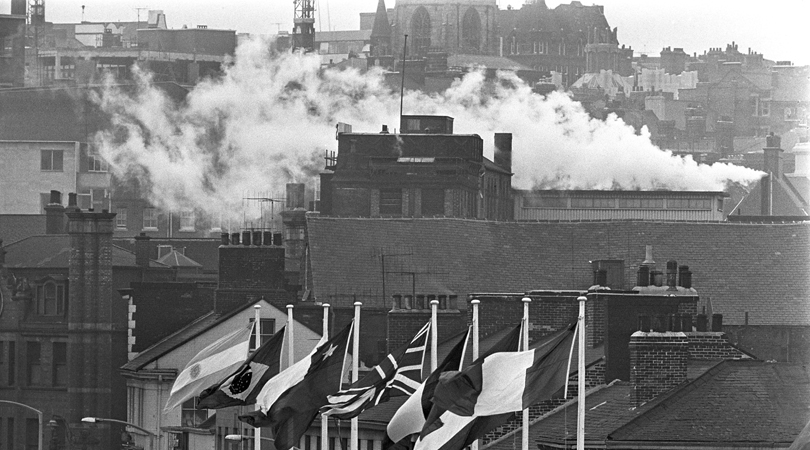
8/7/66: Swiss "sex scandal" in Sheffield
Sheffield formed an industrial backdrop to something of a scandal, or as close as Swiss football has got to one. Players Leo Eichmann, Kobi Kuhn and Werner Leimgruber broke curfew after two local girls drove them around the city: “The five of us were squeezed into this Mini,” Kuhn recalled, “the two women in the front and the three of us crammed into the back. We could barely move.”
The Swiss press broke the story, players’ wives hotfooted it from the Alps and the Swiss FA banned the trio for life; they took legal action and the ban was overturned. Kobi Kuhn even managed the national team at the 2006 World Cup, and presumably warned his players never to clamber into a Mini.
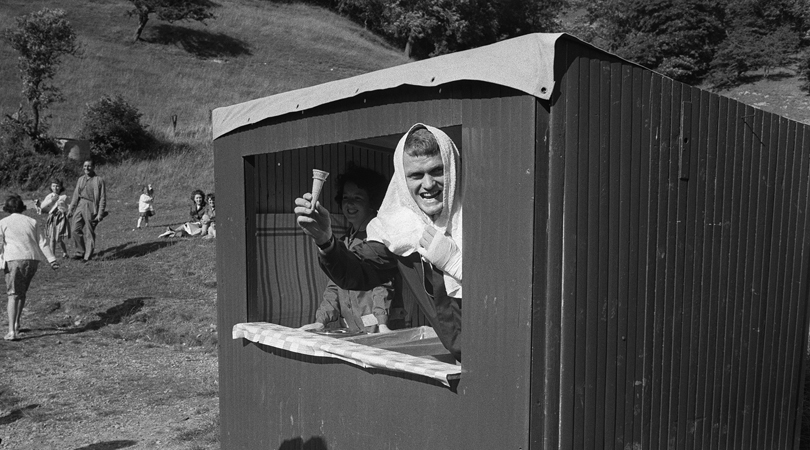
9/7/66: Mine’s a Nein-ty-Nein
Never one to shy from a fun photo op, West Germany goalkeeper Sepp Maier mugs up as an ice-cream seller. With Group 2 games in Sheffield and Birmingham, coach Helmut Schoen scouted for base options and plumped for Ashbourne in the Peak District. They flew in German-language films and their own sausage and bread, but mixed happily with the locals, becoming regulars at the Dog & Partridge pub and dancing at the Sunday night disco.
It worked: they topped the group by hammering the scandal-ridden Swiss 5-0, drawing 0-0 with Argentina and coming from behind to beat Spain 2-1, before despatching Uruguay 4-0 at Hillsborough to reach the semis. With one goal conceded in his first four games, Maier could work on perfecting his curly tops.
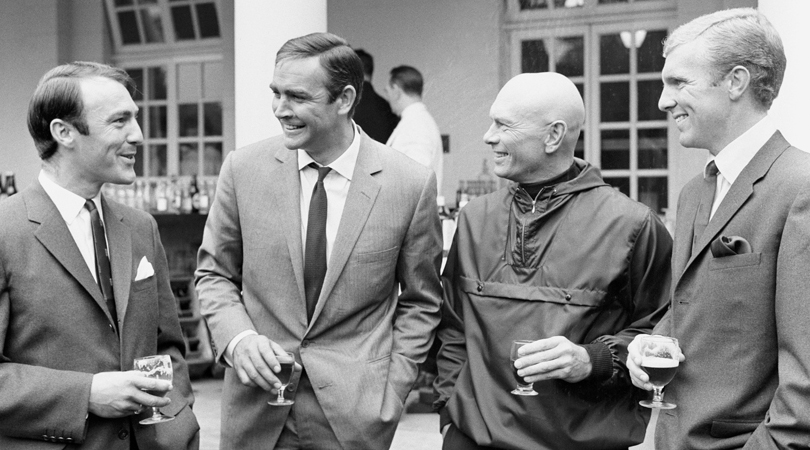
12/7/66: Connery conversation
The day after their disappointing opening 0-0 with Uruguay, the England squad popped to Pinewood Studios, where the latest James Bond film You Only Live Twice was in production. Although Sean Connery (second left, alongside Yul Brynner) was already tiring of being Bond, he had been persuaded to film one more by a bumper pay-cheque.
That further justified a decision Connery had made more than a decade or so earlier, when Matt Busby had offered the young actor – guesting in a local team while touring in a stageshow of South Pacific – a professional contract on £25 a week. Figuring that football was a much shorter career than acting, Connery politely declined his compatriot's offer.
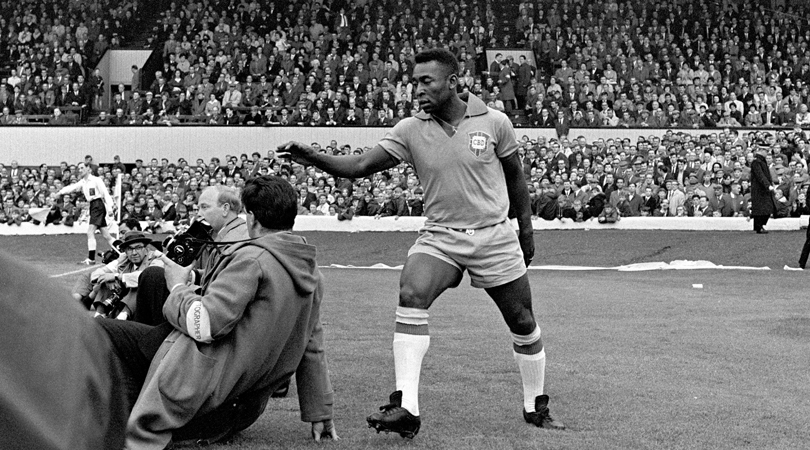
12/7/66: Perils of the job
Pele apologises to a pitchside photographer after a near-accident at their place of work. He arrived in England on top of his game, 25 and the world’s most famous player with two successive World Cup triumphs behind him, but his English experience wounded him – physically and psychologically.
It started well enough, his 15th-minute opener against Bulgaria at Goodison setting up a 2-0 win and making him the first player to score in three World Cups, but brutal Bulgarian retributions ruled him out of the subsequent 3-1 loss to Hungary. He was rushed back for the crucial match with Portugal and again hacked mercilessly; with no substitutions allowed, he was a limping passenger as Brazil lost 3-1 to exit early for the first time in six tournaments. Pele vowed never to play in a World Cup again; thankfully, he changed his mind in time for Mexico 70.
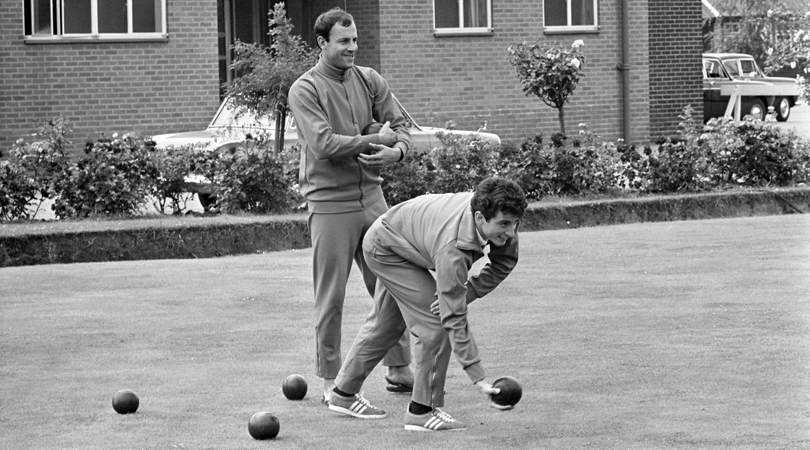
12/7/66: Bowls buddies in Birmingham
Argentina midfielder Carmelo Simeone and forward Alfredo Rojas try a spot of bowls during a break in training in Birmingham. The Albiceleste were glad of the peace and quiet after traffic noise had forced several players to change rooms at their city-centre Albany Hotel.
It didn’t disturb them too much as they beat Spain 2-1 and Switzerland 2-0 either side of a goalless draw with fellow Group 2 qualifiers West Germany. Neither Simeone nor Rojas got any pitch time during the tournament, but the former’s nickname “Cholo” lives on in his unrelated namesake Diego Simeone, having been granted the moniker by a youth coach who felt the young Diego had the same bustling style.
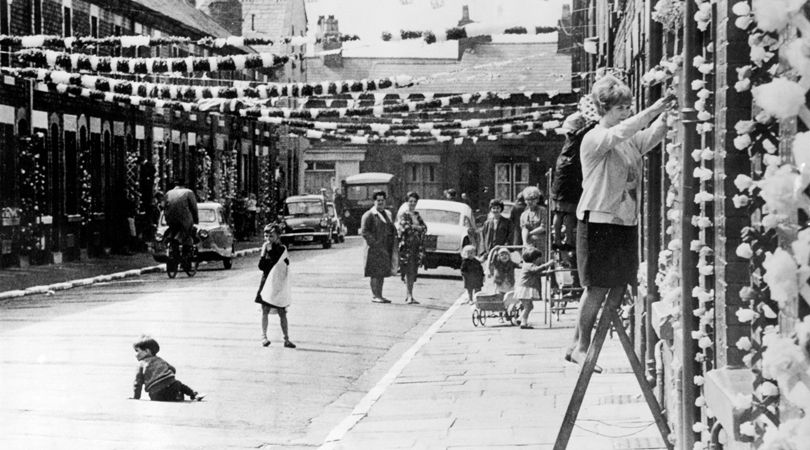
12/7/66: Putting up the bunting
The terraced streets packed close to Victorian football grounds were natural hotbeds of support, and here the World Cup bunting is put out near Goodison Park. Everton’s ground hosted all three of Brazil’s group games, plus Portugal’s amazing quarter-final with North Korea and the semi between West Germany and Soviet Union.
The 58,479 attendance for the Portugal-Brazil group game was the tournament’s biggest outside Wembley, but tickets weren’t always hard to come by. In total, Middlesbrough sold only half the tickets available for matches at Ayresome Park; none of Old Trafford’s three attendances or Roker Park’s four topped 30,000. In July 1966 the government announced a six-month wage freeze and the unemployment numbers doubled by Christmas. The Sixties didn’t swing for everybody.
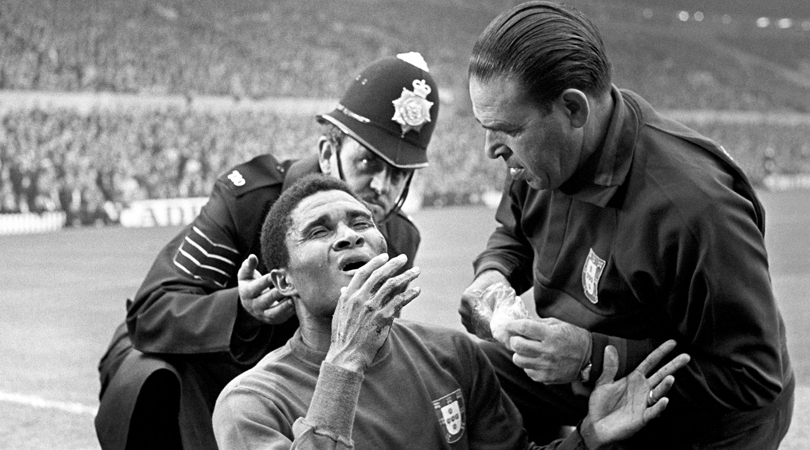
13/7/66 Eusebiohhhh...
A glorious shot of an agonising moment: as a policeman supports his head, Eusebio receives treatment for a cut close to his left eye. The running repairs came during Portugal’s Group 3 opener against Hungary at Old Trafford, and there was no question of him not carrying on, even if substitutions had been allowed. The 1965 Ballon d’Or winner (and 1966 runner-up) had helped Benfica to the 1963 and 1965 European Cup finals and been the Portuguese league’s top scorer for the third successive season.
Having helped Portugal beat Hungary 3-1, Eusebio scored his first World Cup goal during a 3-0 win over Bulgaria. But it was his double in the 3-1 win over double champions Brazil that really caught the eye – if that’s not too painful a phrase.
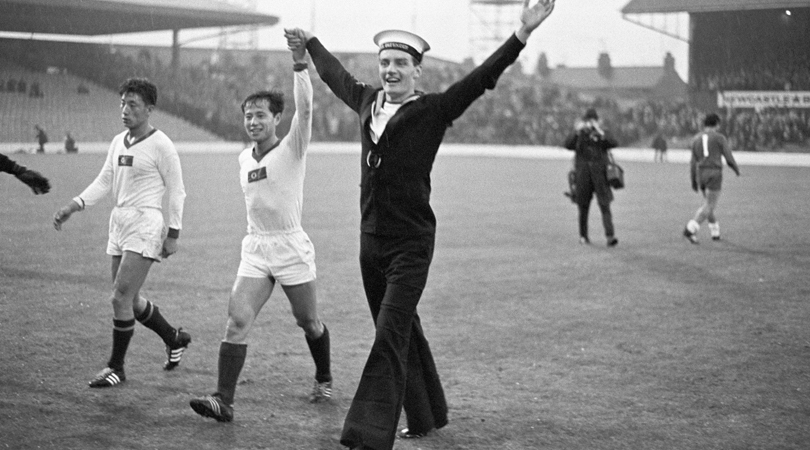
15/7/66: Bell-bottomed cheers
The 1966 World Cup didn’t start well for North Korea. Easily beaten 3-0 by the Soviet Union, they were one down to Chile until 88th-minute equaliser from Pak Seung-Zin – seen here with his hand held aloft by a happy seaman – changed the course of history.
In the next game, Pak Doo-Ik’s winner over mighty Italy sent the Koreans through to a quarter-final against Portugal and the Italians home in ignominy for a reception of rotten tomatoes and a good hard rethink: four years later they would reach the final.
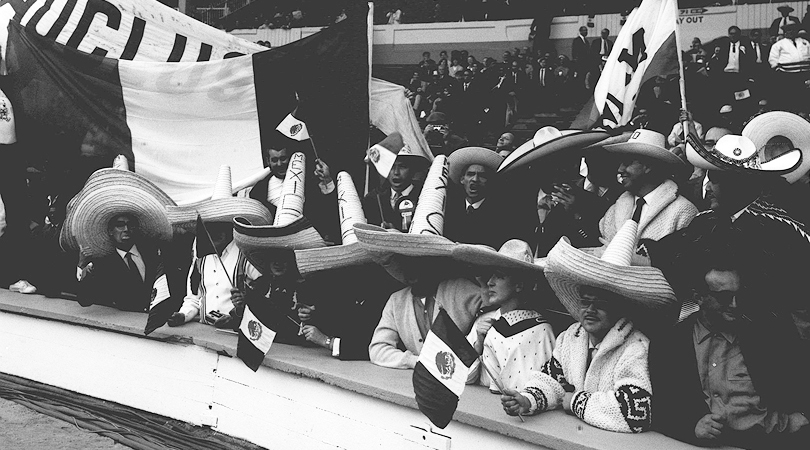
16/7/66: We think they might be Mexicans
Adorned in the sort of sombreros you wouldn’t want to sit or stand behind, Mexican fans gather at Wembley for a group game. Despite qualifying for every World Cup since the war, El Tri had never passed the group stage, although they were gradually improving: having lost all three matches at Brazil 50 and both at Switzerland 54, they’d managed a draw (with Wales) at Sweden 58 and a win in a Chile 62 dead-rubber against Czechoslovakia.
In England, a 1-1 with France and a 2-0 loss to the hosts wasn’t enough to boot them out, and they entered the last group game with a chance to progress if they won – but sadly for these followers adding to the general gaeity of things, a goalless draw with Uruguay saw the sombreros stored away for another four years.
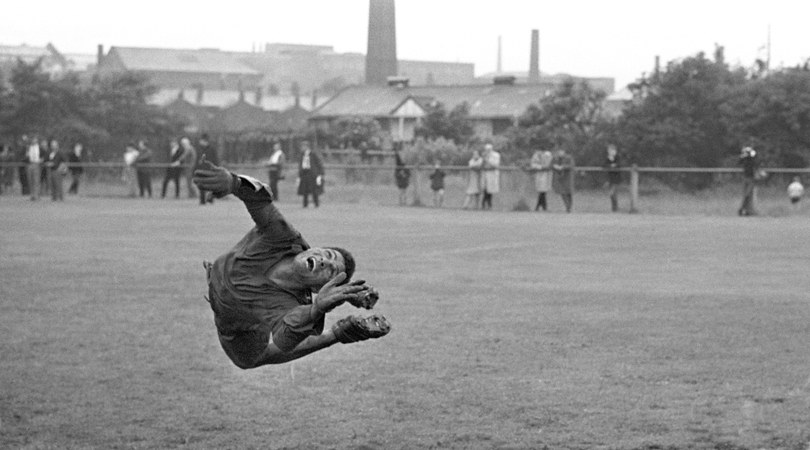
18/7/66 Brazil in Bolton
With all three of their group games scheduled for Goodison Park, the double champions Brazil settled at a hotel in Lymm, near Warrington. Allocated the use of Bolton Wanderers’ facilities, they duly turned up at Burnden Park and were surprised to find long grass and a total absence of goalposts.
Ushered to the Wanderers’ training facilities a mile away at Bromwich Street, they were watched by plenty of curious locals. Here, Manga flings himself into a save; after a 3-1 loss to Hungary left Brazil needing a win against Portugal, the reserve goalkeeper was one of nine changes to coach Vicente Feola’s team. They lost 3-1 and Brazil were out.
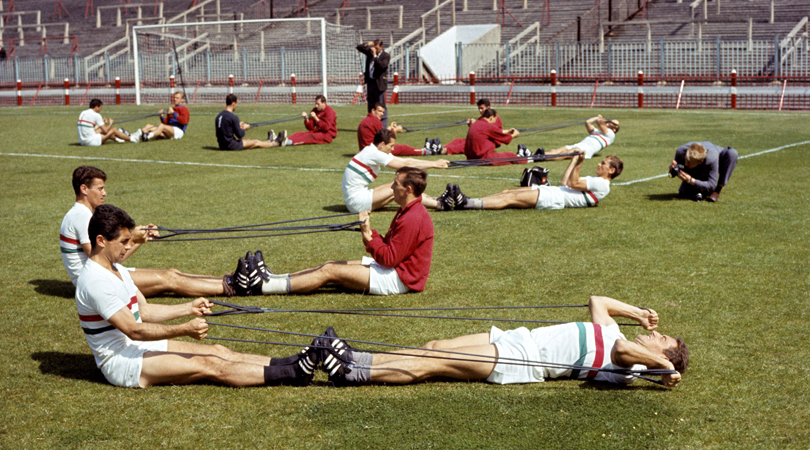
21/7/66: Hungary's last stand
Hungary only brought 18 players to England – they’d left behind four squad men who were deemed surplus to requirements after agitating for more involvement. With quality over quantity, they qualified for a quarter-final at Sunderland; here, they train on the Roker Park pitch, snapped by self-contorting photographers.
Ten years on from Moscow’s crushing of the Hungarian Uprising, awaiting the team in the quarters were their country’s Warsaw Pact overlords the Soviet Union, led from the back by legendary goalkeeper Lev Yashin. Sadly for the Magyars, an early fumble by their own glove-wearer Joszef Gelei gifted the Soviets a lead they extended just after half-time, and although Ferenc Bene’s fourth goal in four games made a game of it, the Hungarians were sent back behind the Iron Curtain. They haven’t made the knockouts since, and haven’t even made the finals since 1986.
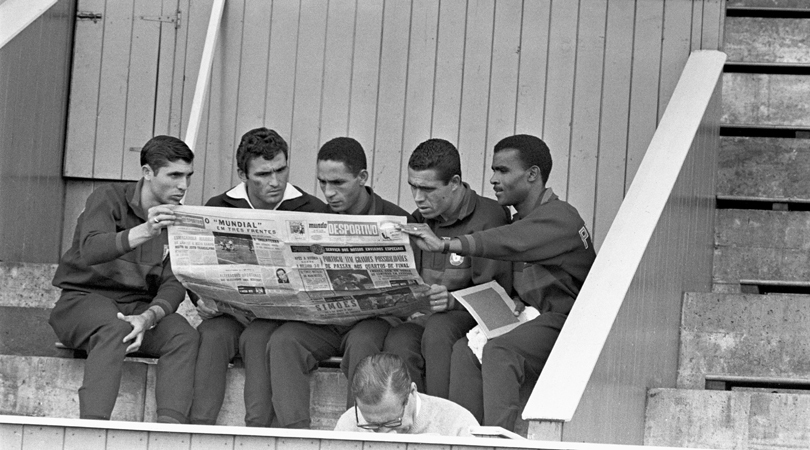
21/7/66: Home news from abroad
Portugal's Jaime Graca, Joao Morais, Hilario, Jose Pereira and Vicente Lucas share a sports newspaper during a training break. The headline says they have a great chance to reach the quarter-final; it’s presumably a couple of days old, because they already had by beating Brazil. Surely they’d be untroubled at Goodison by tiny North Korea?
Not so. The Koreans hared into a 3-0 lead within 25 minutes, but then came the fightback. Perhaps the five newspaper-readers – who all played – feared their own bad press, but it was four-goal Eusebio they had to thank for their eventual 5-3 win.
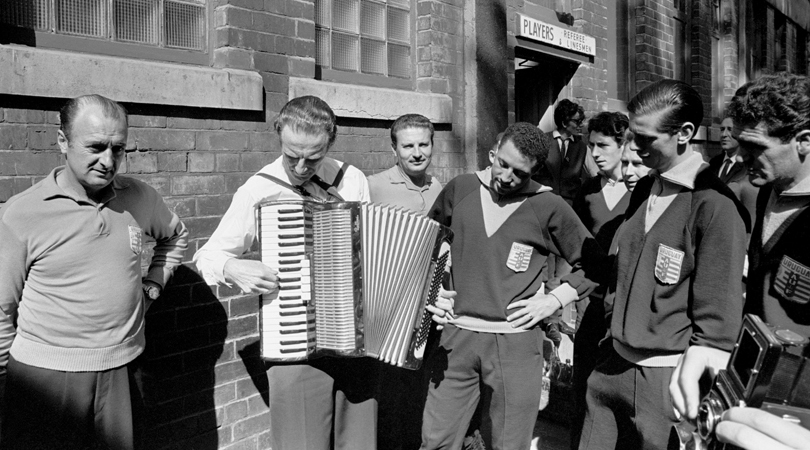
22/7/66: Reaching an accordion
You don’t get entertainment like that any more. Having trained at Hillsborough on the day before their quarter-final, Uruguay were serenaded by an accordion player as they awaited the team bus back to the hotel.
Not that the Uruguayans often made sweet music. They’d squeezed through England’s group with two 0-0s and a 2-1 win, and in the quarter-final quickly went 1-0 down to West Germany. Shortly after half-time, Horacio Troche was dismissed for brawling with Uwe Seeler; five minutes later Hector Silva joined him in the bath and the Germans piled in another three late goals to reach the semi-final.
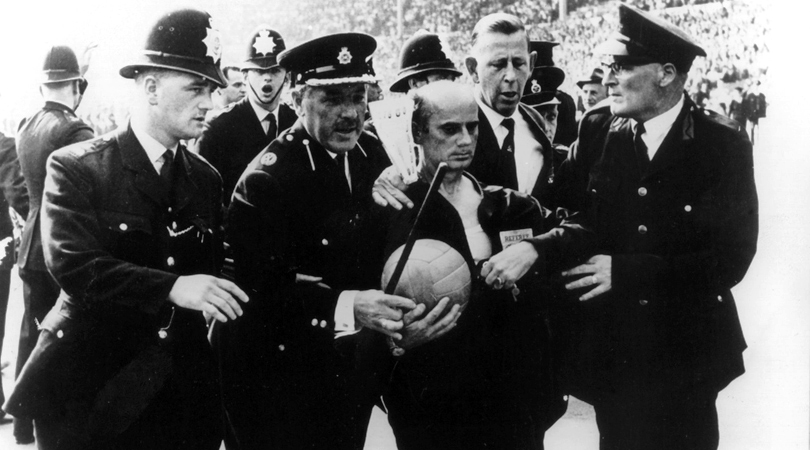
23/7/66: Refer-eek!
Policemen escort West German referee Rudolf Kreitlein from the Wembley pitch to protect him from furious Argentina supporters – and players. Kreitlein had sent off Argentine captain Antonio Rattin in the 35th minute of the quarter-final against England; the player refused to leave the pitch, as he and the referee squabbled at each other in mutually incomprehensible languages. After a separate incident, England’s Jack Charlton only discovered he had been booked when reading the following day’s newspaper.
The confusion helped pave the way for the introduction of yellow and red cards, modelled on the traffic-light system. Although Rattin’s was the 20th expulsion at World Cup Finals, his was the first for a second booking; in a curious coincidence, the other four players sent off during the 1966 finals were all playing against West Germany, while Rattin was sent off by a West German.
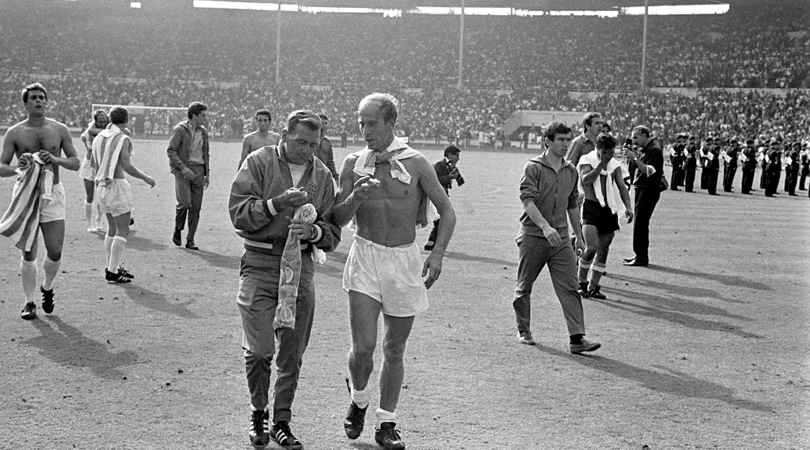
23/7/66: Citrus slickers
And you thought they only got oranges at half-time: an exhausted Bobby Charlton gets a fruity lift from England coach Les Cocker after a hard-fought and controversial quarter-final win over Argentina. Charlton and various other England players have swapped shirts with their opponents, despite the (in)famous attempts of manager Alf Ramsey to stop them.
England-Argentina was the only quarter-final shown live on British television: all four kicked off at the same time, 3pm on a Saturday afternoon. The 1970 knockouts were also simultaneous, and although staggered kick-off times were introduced for 1974 and 1978, those tournaments featured secondary group phases which produced the two finalists.
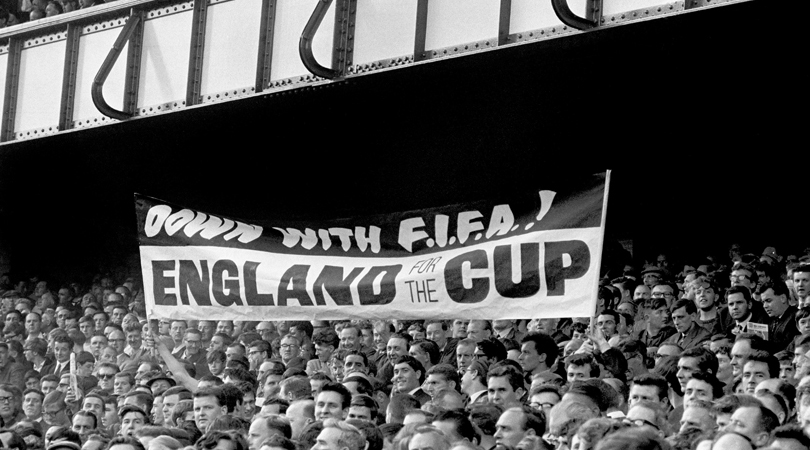
25/7/66: Banner mad
Two days after their triumphs over Uruguay and Hungary respectively, West Germany and the Soviet Union were back in action for their semi-final. Originally scheduled for Wembley, the fixture was switched to Goodison, where England should have played Portugal. In an era when gate receipts were far more important than broadcasting rights or sponsorship deals, FIFA were attempting to maximise ticket sales.
Liverpudlians were infuriated – the Liverpool Daily Post quoted one particularly irate individual calling it “the greatest betrayal in sporting history” – and the semi-final attracted 20,000 fewer fans than had packed Goodison for the Portugal-Brazil group game. They saw West Germany win 2-1, a late Soviet consolation lending the scoreline more excitement than was warranted by “a forgettable match riddled with fouls”.
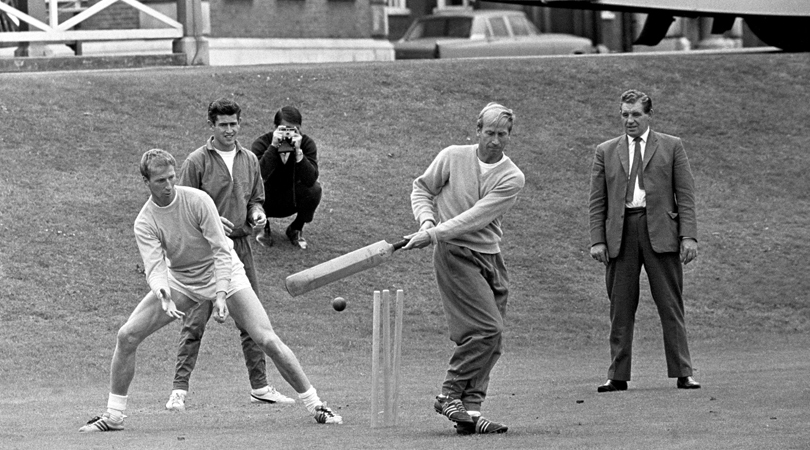
25/7/66: Swing and a miss
An unorthodox stroke from Bobby Charlton, clearly not as comfortable at the crease as he was on a football pitch. Big brother Jack acts as backstop, while reserve goalkeeper Peter Bonetti watches on. The day before their semi-final against Portugal, the England players had a light training session at Roehampton before an even lighter game of cricket.
Wary of exposing his team to long nervous waits in their hotel, Alf Ramsey kept his men busy in a variety of ways. The squad watched Essex play Middlesex at Lord’s, and also went to Muhammad Ali’s gym to watch him prepare for a forthcoming fight against Brian London… but The Greatest was out. So, we guess, was Bobby Charlton shortly after this picture.
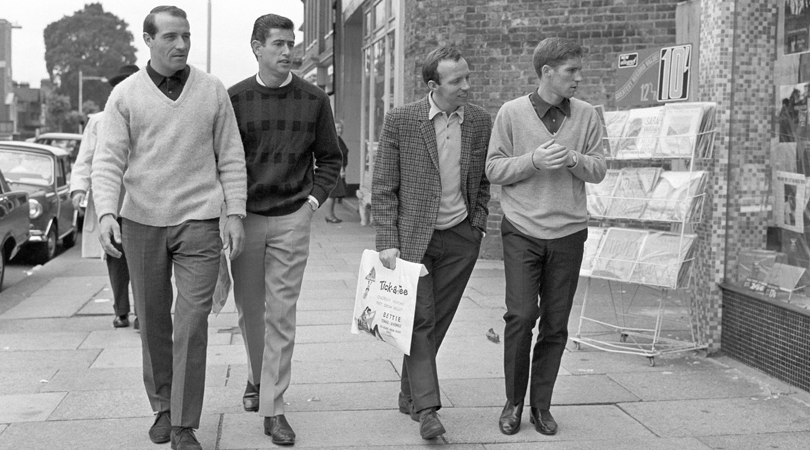
27/7/66: Retail therapy
It’s the day after the semi-final victory over Portugal. Bobby Charlton scored two before Eusebio reduced the deficit in a much better match, one the Guardian’s report called “football at its best, magnificent in every department”.
What better way to celebrate, then, than for Ron Springett, Peter Bonetti, Nobby Stiles and Alan Ball to go shopping in Golders Green? Popping to the shops was a regular way to relax; Charlton and his room-mate Ray Wilson even went clothes shopping on the morning of the final. As Charlton recalled, “We walked down [Hendon’s main street] and not a lot of people knew us at all.”
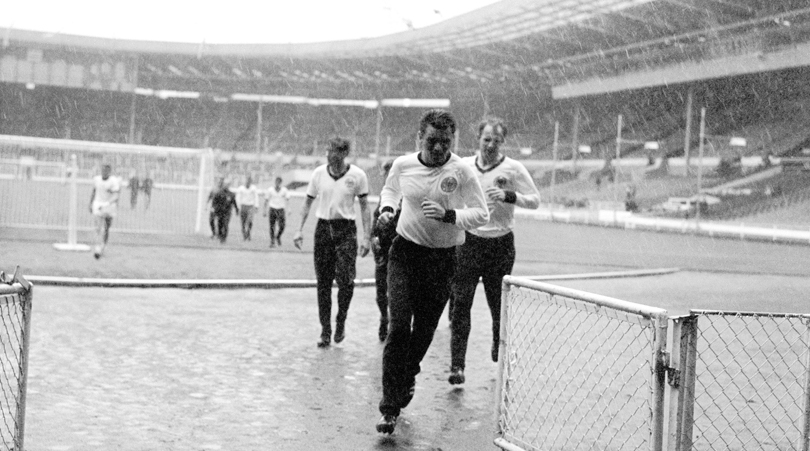
29/7/66: Sturm und drang
The day before the World Cup final, and West Germany’s allotted training time on the Wembley turf is cut short by a sudden thunder storm. They had come a long way from the grotty little changing rooms at the public recreation ground in Ashbourne, where they’d started their campaign.
They had also put together a string of fine performances, marshalled superbly by 20-year-old Franz Beckenbauer. The Soviets’ late consolation was only the second time they’d conceded in five games while banging in 13 goals, more than anyone bar Portugal. England could not afford to think their final opponents would be easier than the Portuguese; they would prove formidable opposition – whatever the weather.
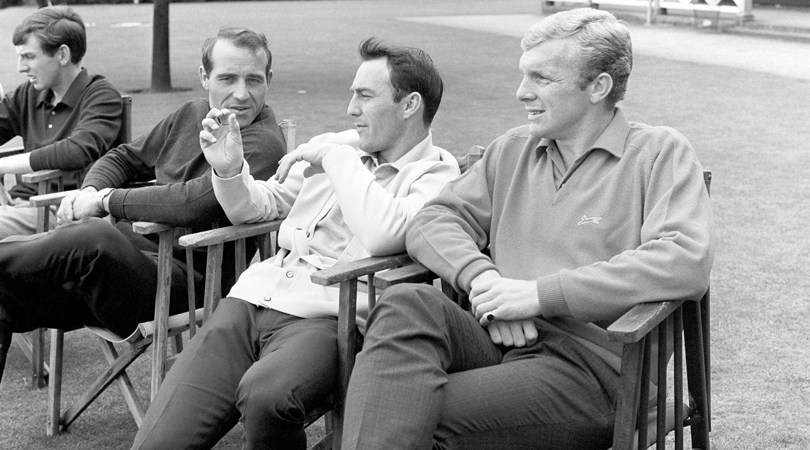
29/7/66: This time tomorrow…
Enjoying one last chance to relax before a date with destiny, England players spend the afternoon before the final playing – and watching – golf at Roehampton. Jimmy Greaves holds the attention of Ron Springett while Bobby Moore cocks an ear.
Later that evening the squad would repair to a local cinema to watch a film together at the Hendon Odeon, as had become something of a favourite Ramsey-encouraged pastime. As squad member Jimmy Armfield recalled, “Alf was sat in the lounge and he said, ‘There’s a cowboy film on at the Odeon, we’re going.’ And he got his coat and just set off, him and [his assistant] Harold Shepherdson. We all got our things and just chased after him down the hill.”
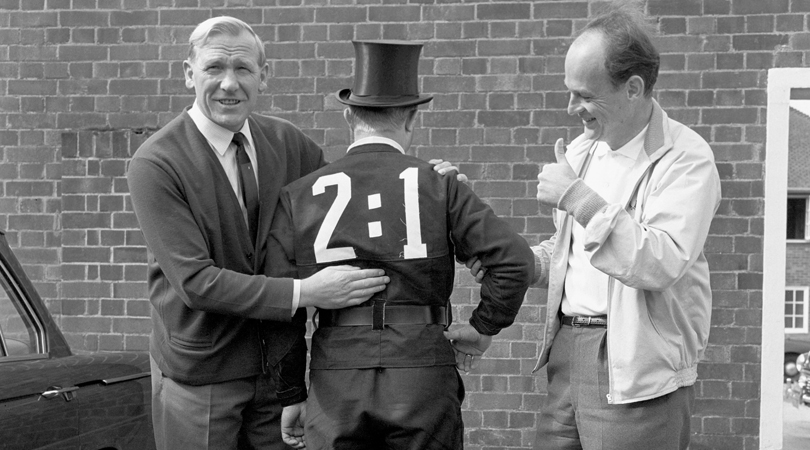
30/7/66: Sweeper's system
On the morning of the World Cup Final, the German camp received an unusual visitor. It has long been regarded good luck to see a chimney sweep in the morning – particularly with a pig, apparently – so a German fan dressed up thusly and popped by the camp.
Team advisor Bert Trautmann (and English resident since the war) and press officer Dr Wilfried Gerhardt welcomed the well-meaning wally, whose jacket back brazenly predicted a 2-1 German win. He got their score right, but was a bit off with England’s; maybe he should have taken a pig.
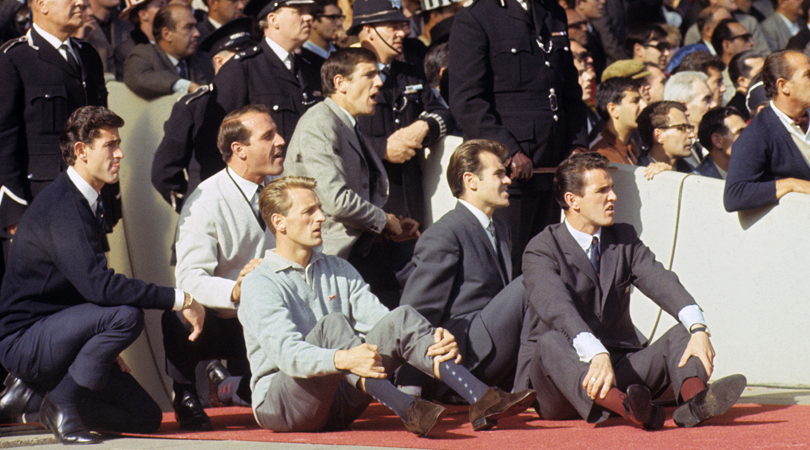
30/7/66: Welcome to the very cheap seats
Unless you’ve been living under a rock in a cave with no Wi-Fi, you know what happened in the final. What you might not know is that the non-playing squad members watched the game not from the comfortable heights of Wembley’s posh seats, but from a rather less salubrious perch – cross-legged on the floor next to the managerial benches.
Here, as absorbed in the action as the rest of the Wembley crowd, are Peter Bonetti, Norman Hunter, George Eastham, Ron Springett, John Connelly and Terry Paine. Difficult to imagine the same seatless privations being ladelled on Messrs Lingard, Livermore and Loftus-Cheek – but then, it’s not easy to imagine them being involved in a World Cup Final.
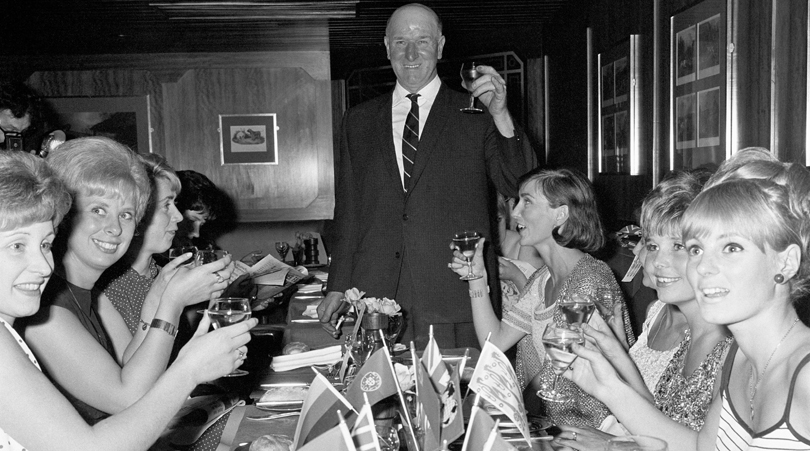
30/7/66: A private function
On the night of the Final, the players were given a celebratory banquet back at the Royal Garden Hotel in Kensington, where the draw had been made all those months ago. To the anger of some players, their wives and girlfriends were not invited, although they were given their own meal in a separate wing of the hotel.
Here they raise a toast; the man standing is Bobby Charlton Snr, whose offspring had provided 18% of the World Cup-winning XI. His eldest lad Jack, sensibly, set out for the evening’s festivities with a note in his breast pocket saying “This body is to be returned to Room 508, Royal Garden Hotel”. It didn’t work: he woke up on a stranger’s floor in Walthamstow.
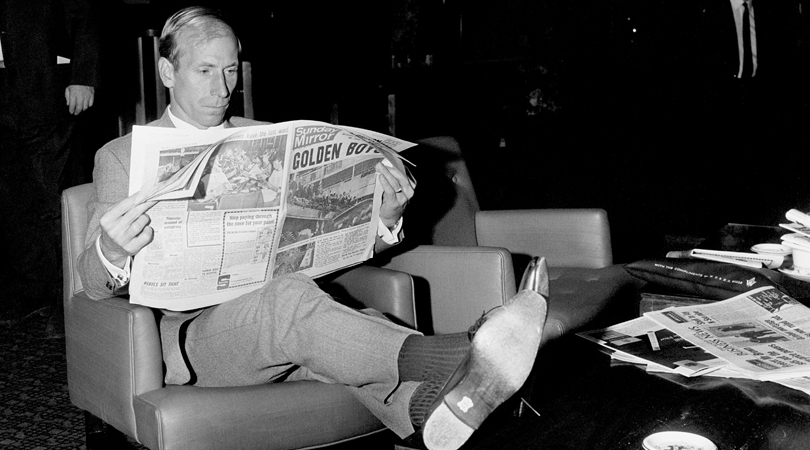
31/7/66: What have we done?
The morning after the night before, and while brother Jack finds his way back from Walthamstow (hampered by the Victoria Line not yet being built), Bobby Charlton checks the press. A thoughtful soul whose life had been profoundly affected by surviving the Munich disaster in which so many friends perished, Bobby was nevertheless coming to terms with the enormity of what had been achieved.
“As soon as the final whistle went,” Charlton later said, “I said to my brother: ‘You know, Jack, life for us will never be the same again.’ And I was right.” Not only had the brothers become champions of the world, they had also set a benchmark by which all other English football achievements would be judged for more than half a century – and who knows how much longer.
Gary Parkinson is a freelance writer, editor, trainer, muso, singer, actor and coach. He spent 14 years at FourFourTwo as the Global Digital Editor and continues to regularly contribute to the magazine and website, including major features on Euro 96, Subbuteo, Robert Maxwell and the inside story of Liverpool's 1990 title win. He is also a Bolton Wanderers fan.
 Join The Club
Join The Club





